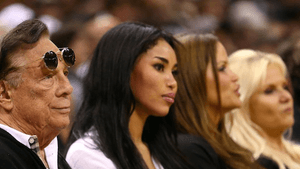Stay in the Loop
BSR publishes on a weekly schedule, with an email newsletter every Wednesday and Thursday morning. There’s no paywall, and subscribing is always free.
The love song of the sports franchise owner
Donald Sterling: Tragedy or farce?

Donald Sterling’s abrupt downfall reminds us once again that in life, as in politics, the right things often happen for the wrong reasons.
Sterling, you’ve surely heard, is the wealthy octogenarian real estate tycoon who has owned the long-suffering Los Angeles Clippers for 33 years but who last week was banished for life from the National Basketball Association after he was overheard scolding his alleged ex-mistress for posting a photo of herself with Magic Johnson on her Instagram page.
"It bothers me a lot that you want to broadcast that you're associating with black people,” Sterling reprimanded her in a surreptitiously recorded conversation. "You can sleep with them. You can bring them in, you can do whatever you want," but "the little I ask you is….not to bring them to my games." The fact that Sterling’s alleged ex-mistress is herself black, as are 76 percent of pro basketball players, as are most of his Clippers players, seemed to have escaped Sterling’s analysis.
You and I, of course, have never uttered a foolish or bigoted word in the privacy of our homes, and certainly not in the presence of our alleged former paramours. (Truth to tell, in a moment of anger I once called my wife a “Lithuanian fruitcake.” Or was that one of my alleged ex-mistresses? It’s so hard to keep track.) In this particular case Sterling committed no crime (even adultery is no longer illegal), nor did he oppress or publicly offend anyone. All he did was express a nutty idea in his living room.
Poor black players, rich white coach
On the other hand, Sterling’s nutty and bigoted public behavior has been tolerated by the NBA for more than three decades. In August 2006, the U.S. Department of Justice sued Sterling for refusing to rent apartments to African Americans in Beverly Hills and to non-Koreans in the Koreatown neighborhood of Los Angeles. In November 2009, Sterling agreed to pay a fine of $2.7 million to settle claims brought by the Justice Department that he engaged in discriminatory rental practices against Hispanics, blacks, and families with children. In February 2009, Sterling was sued by a living legend of pro basketball, former longtime Clippers executive Elgin Baylor, for employment discrimination on the basis of age and race; that lawsuit alleges Sterling told Baylor that he wanted to fill his team with "poor black boys from the South and a white head coach." The suit also alleges that Sterling gave his white head coach a four-year, $22-million contract while Baylor's salary had been frozen at a comparatively paltry $350,000 since 2003. During the 2010 season Sterling was observed heckling players on his own team while he sat at courtside during the Clippers’ home games.
Clearly, Donald Sterling is a walking poster boy for Martin Luther’s 500-year-old observation: “Riches are the least worthy gifts which God can give men. Therefore, God commonly gives riches to foolish people, to whom he gives nothing else.” Why, then, didn’t the NBA banish Sterling years ago?
Tose’s gambling addiction
The answer, I suggest, is that owners like Donald Sterling — overgrown adolescent egomaniacs who perceive their teams as expensive personal toys and whose wealth has persuaded them that they are exempt from the rules of conventional behavior — are the rule rather than the exception in professional sports. Marge Schott, president of the Cincinnati Reds from 1984 to 1999, once referred to two of her outfielders as “million-dollar niggers”; on another occasion, she remarked, "I would never hire another nigger. I'd rather have a trained monkey working for me than a nigger." (She wasn’t banned from Major League Baseball until she professed admiration for Adolf Hitler). Leonard Tose, who owned the Philadelphia Eagles, was an admitted compulsive gambler and alcohol abuser whose blackjack losses in Atlantic City casinos — $14.6 million during one five-year period — forced him to sell the team in 1985. George Steinbrenner, the imperious and fiercely competitive boss of the New York Yankees, made a fetish of modeling himself after warriors like Patton, MacArthur, and Attila the Hun (I am not making this up), although Steinbrenner himself never saw military combat.
Change of name
I ask you: Why would anyone invest hundreds of millions of dollars in a nasty and ludicrous public business like pro sports when he could derive far greater satisfaction by supporting, say, schools, hospitals, theaters, orchestras, or dance companies? The answer: Either he lacks the necessary taste, or he’s hungry for attention, or his great wealth has clouded his judgment.
You can’t help feeling sorry for Donald Sterling. Like Wang Lung, the peasant protagonist of Pearl S. Buck’s novel The Good Earth, he’s a man of narrow background who made more money than he knew what to do with. Wang Lung destroyed himself in private; Sterling self-destructed on a national stage.
Incidentally, Sterling’s name at birth was Donald Tokowitz; he changed it when he was 25 to advance his legal career. Curiously, I used to fantasize about the myriad opportunities that might have come my way had my name been Lance Sterling instead of Dan Rottenberg. My thanks to Donald Sterling for conclusively demonstrating that those are the sorts of opportunities I can do without.
To paraphrase Sir Thomas More in Robert Bolt’s A Man For All Seasons: It profits a man nothing to give up his soul for the whole world . . . but for the Los Angeles Clippers?
Sign up for our newsletter
All of the week's new articles, all in one place. Sign up for the free weekly BSR newsletters, and don't miss a conversation.

 Dan Rottenberg
Dan Rottenberg